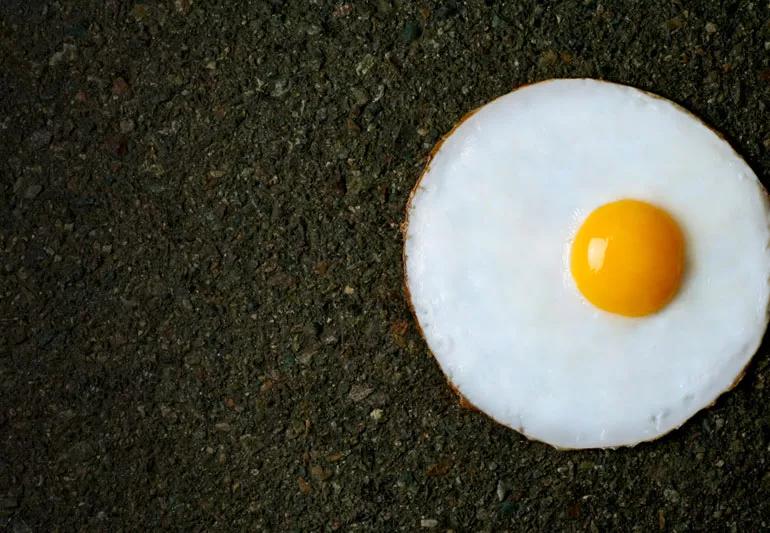Be aware of the summer health hazard right under your feet

Image content: This image is available to view online.
View image online (https://assets.clevelandclinic.org/transform/27781156-a789-486c-836d-76829e8f7f27/hotPavement-123496434-770x553_jpg)
Fired egg on hot pavement
It might be a myth that you can fry an egg on a hot sidewalk, but it’s a fact that you can burn your skin on one.
Advertisement
Cleveland Clinic is a non-profit academic medical center. Advertising on our site helps support our mission. We do not endorse non-Cleveland Clinic products or services. Policy
Pavement, especially asphalt, absorbs a lot of heat. On a sunny summer day, the ground can get hotter than the surrounding air — and hot enough to cause skin to burn.
A recent study found that this is especially true in areas of direct sunlight when the air temperature exceeds 95 degrees Fahrenheit.
A little knowledge and preparation can go a long way in preventing thermal burns during the summer. Make sure you’re always wearing adequate footwear when you go outside — even if you’re just walking down the driveway to get the mail.
And be aware of additional dangers that hot pavement poses to certain groups of people.
Seniors, especially those who have neurological conditions, are prone to falls. And falling becomes even more dangerous when it happens on a hot driveway, sidewalk or parking lot.
“A lot of patients need assistance to get up, or it takes a while for them to get up,” says Shaina Meyer, an occupational therapist at Cleveland Clinic’s Lou Ruvo Center for Brain Health.
“On hot pavement, even if it takes a minute to get up, they could be at risk for burns.”
Meyer recommends that anyone with a history of falls keep a towel or blanket in their car that could be rolled underneath them to protect their skin if they fall and are unable to get up. She also recommends a car cane, which locks into the latch of a car door so that someone who needs assistance getting in or out of the vehicle doesn’t have to touch the hot exterior of the car for support.
Advertisement
Hot pavement can also be dangerous for people who have neuropathy, says emergency medicine physician Baruch Fertel, MD. If they experience decreased sensation in their feet, they might not realize if they are stepping on a surface that’s reached an unsafe temperature. Anyone with this condition should always wear well-fitted shoes with supportive bottoms on hot and sunny days.
The U.S. Consumer Product Safety Commission has warned that children can get thermal burns from playground equipment. And it’s not just those metal slides that can heat up to dangerous temperatures — plastic and rubber equipment can burn a child’s skin, too.
Dr. Fertel recommends doing a touch test of playground equipment to make sure it’s not too hot before letting kids play on it.
Running around barefoot at the pool or beach can also be harmful to kids’ little feet, so make sure they have appropriate footwear for these occasions.
Take extra caution with very young children. They may not yet have well-developed withdrawal reflexes or may not be able to remove themselves from a hot surface if they are placed on one accidentally or unknowingly.
If you or someone else gets burned from a hot surface, the first step is to remove yourself or the person from the heat source. Then cool the burn as quickly as possible by applying cool compresses or putting it under cool running water for a few minutes. (Ice or very cold water is not recommended.)
Second- and third-degree burns need professional medical care, Dr. Fertel says. These are burns that affect more than just the outer layer of the skin. Head to the emergency department if you see:
If the burn is smaller than the palm of your hand and does not have any of the above characteristics, you may be able to treat it at home with the following steps:
Advertisement

Sign up for our Health Essentials emails for expert guidance on nutrition, fitness, sleep, skin care and more.
Learn more about our editorial process.
Advertisement
Get quick relief with ice chips, popsicles, milk and saltwater
Ice (and icy water) can actually make a burn worse, not better
Establish rules and have a safety plan in place
Resist the urge to peel, and treat your healing skin to some much-needed hydration
Ice, saline rinses, OTC pain meds and honey can all help soothe a troubled taster
Keeping you + your family safe
Type 2 diabetes isn’t inevitable with these dietary changes
Applying a hot or cold compress can help with pain
Pump up your iron intake with foods like tuna, tofu and turkey